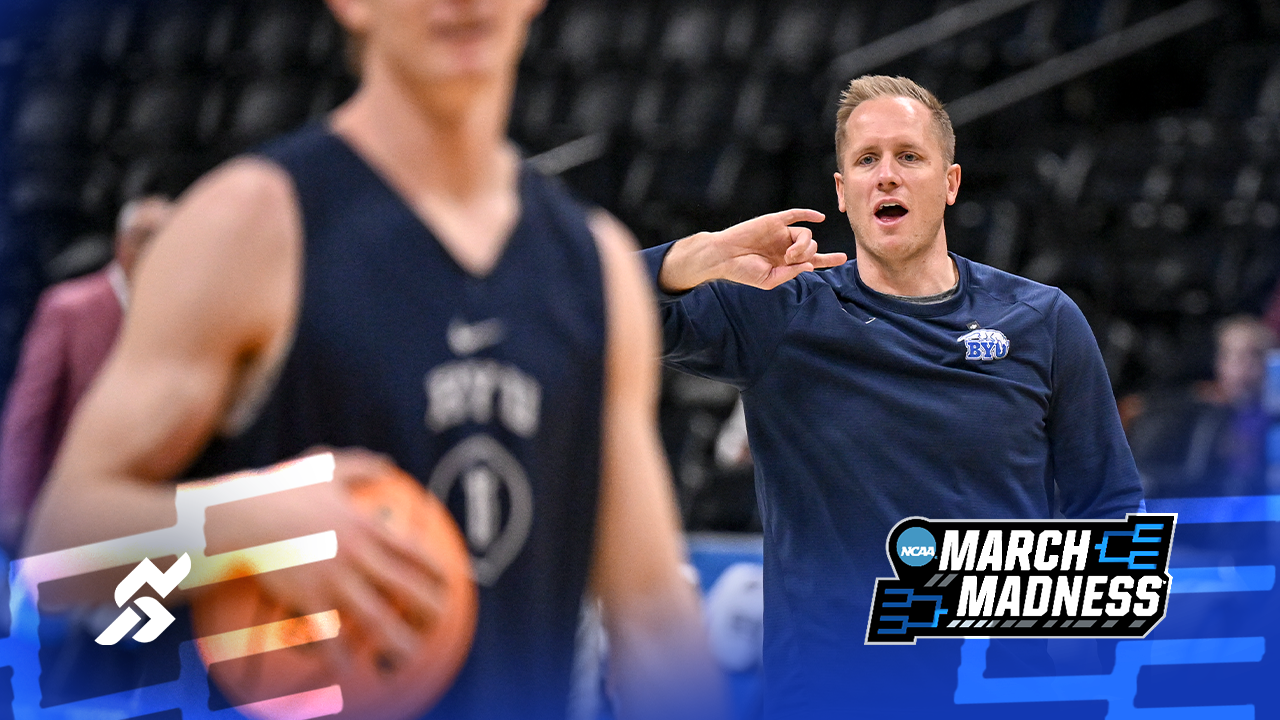
Brigham Young University alumni and donors haven’t had a chance to root on their school in a Sweet 16 game since 2011 when sharpshooter Jimmer Fredette carried the team into the national spotlight. That will change Thursday night when the No. 6 seed Cougars face the No. 2 seed Alabama Crimson Tide in Newark, N.J.
A key difference this time around: BYU’s rabid fanbase has more influence than ever in its success.
The Cougars’ latest NCAA Tournament run is firmly connected to the NIL era, which has enabled the school’s wealthy donors to contribute to the program’s accomplishments in ways they previously could not.
It’s one of the main reasons that former NBA assistant Kevin Young decided to ditch the pros to be the head coach at the Mormon Church-supported institution in Provo, Utah.
As the NIL landscape shifts with the implementation of revenue sharing on the horizon, Young said, BYU’s contributors will become more and more important.
“As things become more regulated, it’s not going to be a needle-mover, it’s going to be the starting point,” Young said. “One of the reasons I wanted to come to BYU was because of the fan and donor base. I know people have school pride, but BYU is unmatched in terms of people who love the school, what it stands for and the amount of alumni who are extremely successful.”
One of those alumni is Qualtrics co-founder Ryan Smith, a billionaire who owns the NBA’s Utah Jazz and other local pro sports teams. Smith is one of several big-time supporters who has aided in resources, while also assisting the athletic department with strategic ideas. Still, Smith said on X in December he didn’t provide financial backing to land top-ranked prospect AJ Dybantsa, who reportedly will receive an NIL deal valued between $5 million and $7 million to join the Cougars.
Dybantsa’s advisor, Leonard Armato, previously told Sportico that some schools vying for Dybantsa’s services dropped out once the revenue-share talks surrounding the House v. NCAA settlement turned from speculation to soon-to-be reality. Schools cited a need to save for the upcoming financial burden, which could go into effect as early as July.
But not the Cougars, who are trying to adapt to the national shift while reenergizing their donor base.
“It sets a standard, and that’s a better situation for BYU, especially from where we have been in the past,” BYU athletic director Tom Holmoe said in a phone interview. “There’s been a lot of money under the table for decades and decades. Now, with rev-share, it’s going to be different than it was last year. … If Kevin and his staff can continue to build upon the foundation, it’s going to be success in the future.”
Sportico will be publishing daily stories about March Madness throughout the men’s and women’s tournaments. To receive them in your inbox daily, sign up here via Club Sportico.
BYU formerly competed in football as an independent before joining the Big 12 in 2023—a switch that gives the Cougars a capital injection from Big 12 broadcast rights fees. Holmoe said the distribution revenue coincides with an uptick in donors stepping up to keep their sports teams competitive.
“They want to see BYU and the church respond,” Holmoe added.
The combination of Dybantsa’s arrival and the success of this year’s men’s basketball team, featuring freshman Egor Demin, who reportedly received more than $1 million in NIL money, highlights what BYU can provide blue-chip athletes via its nonprofit collective, The Royal Blue. The donor support and Young’s NBA pedigree make Provo an attractive stop for aspiring NBA prospects, even with BYU’s strict church-based honor code, which forbids sex outside marriage, as well as alcohol, tobacco and marijuana use.
Alumni who have built the Silicon Slopes, the nickname for the growing tech hub around Provo and Salt Lake City, have also become a crucial part of the BYU NIL war chest.
“If you drive south on I-15 from Salt Lake, you just see startup after startup, tech company after tech company, successful person after successful person,” Young said. “Most of them went to BYU, so this place is set up to succeed. I’m definitely riding the wave of all of that.”
Even Fredette, who gives advice to current players like Trevin Knell, is now a partner at Draper-based investment firm Tandem Ventures. The vast network of BYU alumni has for decades provided each other with money-making opportunities. That isn’t expected to stop.
Meanwhile, Royal Blue continues to have talks with the school about going in-house in response to the upcoming revenue share model.
Regardless, the increased media exposure from on-court success could further drive donations from the international BYU fanbase. “It gives us all kinds of attention,” Holmoe said. “You look at AJ coming in and the players we have this year and how they’re playing together. Along with playing well against Big 12 teams, it’s a combination of all of that. It’s a credit to Kevin and his staff and the players.”
BYU is looking for its first Elite Eight appearance since 1981, as Knell, Demin and Richie Saunders, the great grandson of the Ore-Ida food empire, look to keep the run going on Thursday. They’ve already set the stage for next season, when potential No. 1 overall NBA draft pick Dybantsa takes the floor.
“I planted the flag when I got the job and said I wanted to make BYU the best place in all of college basketball to help guys get to the league,” Young said. “I think we’re off to a good start.”
Update: BYU lost 113-88 to Alabama in the Sweet 16 on Thursday.

